Maximizing Your Online Presence With Enterprise SEO Tactics & Strategies
Enterprise SEO allows companies to maximize their visibility across the web, helping them attract new customers, earn higher rankings on search engine results pages (SERPs), and increase their overall profits.
What typically makes enterprise SEO unique is the volume of pages (often thousands of pages) and SEO strategies needed to grow online visibility.
There are many enterprise SEO solutions to consider.
This guide will discuss how you can use Enterprise SEO strategies to boost your online presence and accelerate topic dominance to find growth opportunities.
What is Enterprise SEO?
Enterprise SEO is a more comprehensive form of search engine optimization that focuses on optimizing the visibility of your website for large volumes of traffic and maximizing its reach across multiple digital channels.
It takes into account all aspects of your online presence, including user experience, content strategy, link building (internal & external), online marketing, and technical implementation.
By employing an enterprise approach to SEO, businesses can ensure their website stands out from the competition and is seen by as many potential customers as possible.
What are the Benefits of Enterprise SEO?
The benefits of Enterprise SEO are numerous. Not only will you be able to reach a broader audience, but you will also be able to establish yourself as an authoritative brand in your industry and increase customer loyalty.
Additionally, enterprise search engine optimization can help content marketing teams to reach the target audience by reaching the first page of Google through optimized content.
How to Implement Enterprise SEO Tactics
Implementing enterprise SEO tactics requires a combination of strategies, including a full 360° SEO audit, optimizing content by topic cluster for search engine algorithms, improving user experience, creating high-quality content, resolving any technical issues, and leveraging link building.
Getting a lay of the land
Embarking on a journey to maximize your online presence begins with understanding your current position in the digital landscape.
An enterprise SEO website audit is the first step in this process, as it provides a comprehensive analysis of your website’s strengths, weaknesses, and opportunities for improvement.
An enterprise SEO audit evaluates your website’s optimization from various angles, including user experience, content strategy, link building (internal and external), online marketing, and technical implementation.
By conducting an audit, companies can make data-driven decisions to bolster their websites’ performance, ensuring they stand out from the competition and attract potential customers.
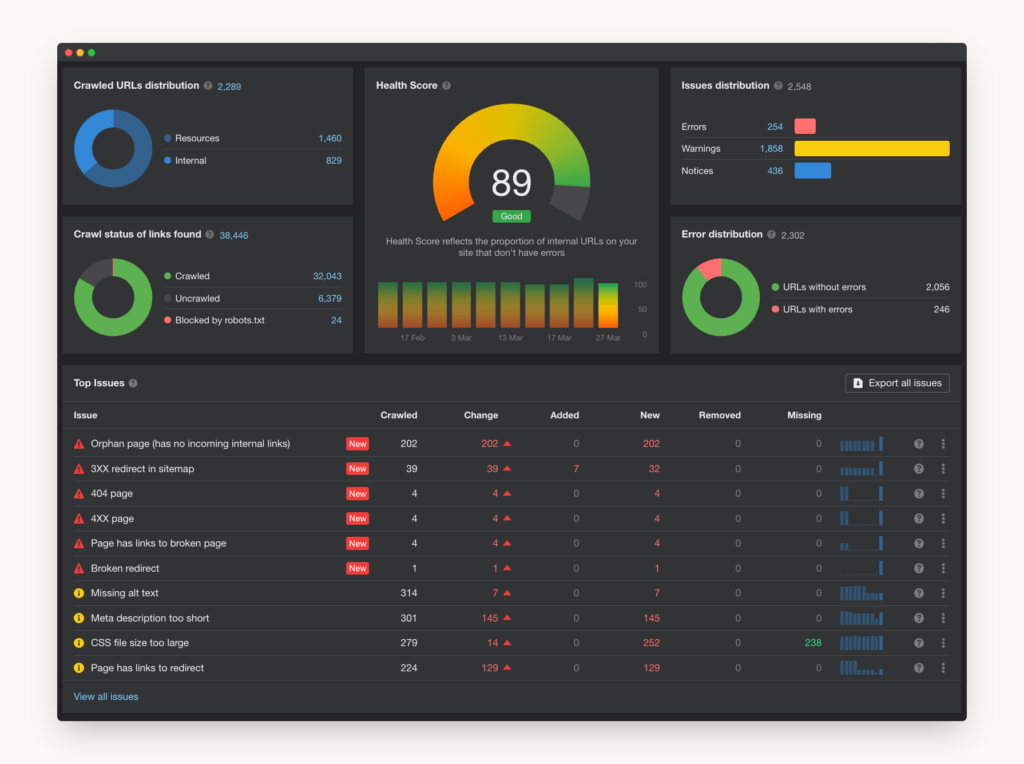
Website Architecture
A well-structured website facilitates smooth navigation and a positive user experience, which ultimately improves search engine rankings. The audit should assess:
- Site hierarchy: Ensure a logical organization of pages, with clear categories and subcategories.
- URL structure: Use clean, descriptive URLs that accurately represent the content on each page.
- Internal linking: Implement a strategic internal linking plan to distribute link equity and help users navigate your site efficiently.
- XML sitemap: Verify that your sitemap is up-to-date and submitted to search engines for efficient crawling and indexing.
We recently audited an enterprise SEO website for Trailscarolina.com, a leading therapeutic wilderness program for struggling teens.
We began by analyzing Trailscarolina.com’s site hierarchy, ensuring that it was logically organized with clear categories and subcategories.
We also assessed their URL structure, making sure each URL was clean, descriptive, and accurately represented the content on the page.
To improve the website’s internal linking, we devised a strategic plan to distribute link equity and help users navigate the site more efficiently.
Finally, we updated their XML sitemap and submitted it to search engines to facilitate crawling and indexing.
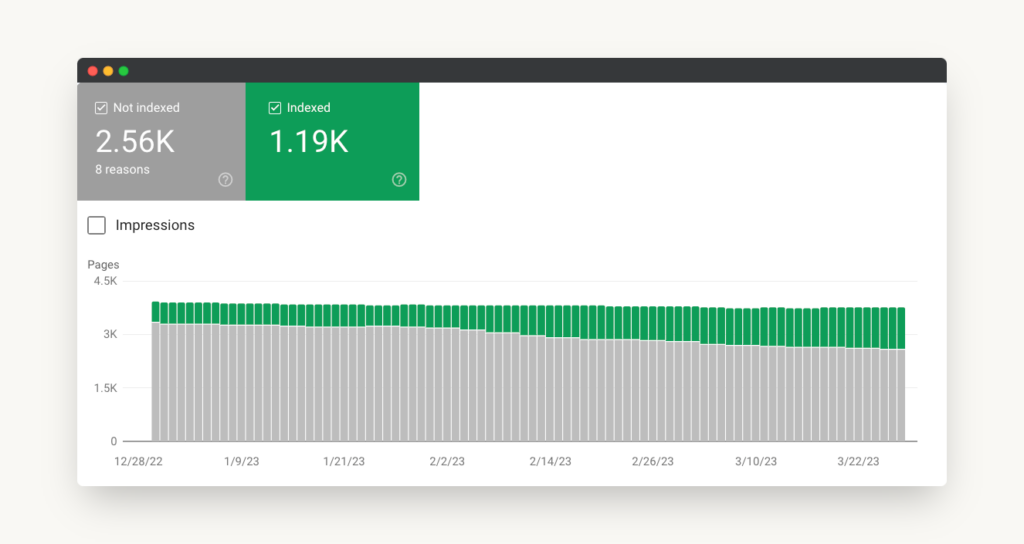
Technical Issues
Addressing technical issues is crucial for improving site performance, user experience, and search engine visibility. Key technical aspects to evaluate during the audit include:
- Mobile-friendliness: Ensure your website is responsive and optimized for mobile devices.
- Site speed: Identify opportunities to improve website loading times, such as optimizing images, using CDNs, and minifying code.
- Structured data: Implement schema markup to provide additional information to search engines and enhance your search result listings.
- Crawl errors: Analyze your website’s crawlability, using tools like Google Search Console, to identify and fix issues that may prevent search engines from indexing your content.
Continuing with our example of Trailscarolina.com, we used a combination of SEO tools (AHREFs site audit, SERanking site audit, and Screaming Frog) to identify the site’s technical issues. We ran into a common enterprise-level issue.
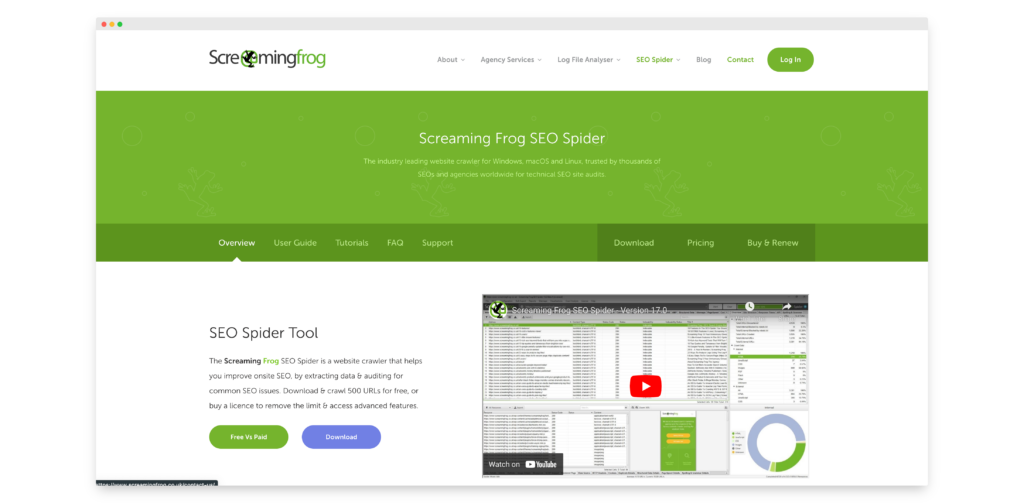
The larger businesses typically have technical SEO issues that have accumulated over time. Trailscarolina.com was no exception.
The technical issues we found that had the largest impact were basic SEO on-page issues such as proper heading tags, meta descriptions, and internal linking.
The lack of keyword focus on a per-page basis and also keyword overlap caused significant keyword cannibalization.
keyword cannibalization is when an individual web page is optimized for multiple keywords, which causes the page to compete against itself in search engine results.
Once we identified and addressed these technical issues, we were able to improve the visibility of Trailscarolina.com in organic search results by over 22%.
In addition, our technical audit also revealed other common enterprise-level SEO issues, such as duplicate content, slow page speed, and crawl errors. We identified these issues and developed a comprehensive plan for resolving them.
The result was improved website performance, higher user engagement rates, better search engine visibility, and increased organic traffic.
Target Keywords and Topic Clusters
A successful enterprise SEO strategy involves targeting the right keywords and organizing content around relevant topic clusters.
These topic clusters need to have proper internal links to tie them all together. Often internal linking on an enterprise website looks more like a bowl of spaghetti instead of a well-crafted content map.
The keyword research and intern links audit should:
- Analyze current keyword performance: Evaluate which keywords are driving traffic and conversions, and identify areas for improvement.
- Identify new keyword opportunities: Conduct competitor and niche-specific research to discover additional high-value keywords.
- Create topic clusters: Organize related content into clusters to strengthen your website’s topical authority and improve internal linking.
We analyzed Trailscarolina.com’s current keyword performance and identified areas for improvement.
Through competitor and niche-specific research, we discovered new high-value keywords for the business to target. We then organized their content into relevant topic clusters to strengthen the website’s topical authority and improve internal linking.
Backlink Profile per Topic Cluster
A robust backlink profile is essential for improving search engine rankings for any enterprise site. During the audit, assess:
- The overall quality and diversity of backlinks: Identify and disavow harmful links, and focus on acquiring high-quality, relevant backlinks.
- Backlinks per topic cluster: Analyze the distribution of backlinks across your topic clusters, identifying opportunities to improve the link equity of underperforming content.
We assessed Trailscarolina.com’s overall backlink profile, identifying and disavowing any harmful links while focusing on acquiring high-quality, relevant backlinks.
We also analyzed the distribution of backlinks across their topic clusters and identified opportunities to improve link equity for underperforming content.
Relevant Content Inventory
A comprehensive content inventory provides valuable insights into your existing content’s performance and areas for improvement.
There are often big opportunities when transforming existing content. The goal here is to identify what existing content you can use to create high-quality content that ranks for competitive keywords.
The SEO content audit should:
- Catalog existing content: Create a database of all content on your website, including articles, videos, infographics, and more.
- Evaluate content performance: Analyze metrics like organic traffic, engagement, and conversions to determine which content is resonating with your audience.
- Identify outdated or low-quality content: Flag content that may need updating, repurposing, or removal to improve the overall quality of your website.
We cataloged all existing content on Trailscarolina.com, including articles, videos, infographics, and more. We evaluated the performance of each piece of content, analyzing metrics like organic traffic, engagement, and conversions.
Our team flagged outdated or low-quality content for updating, repurposing, or removal to improve the website’s overall quality.
Content Gap Analysis
A content gap analysis identifies opportunities to create new content that addresses your target audience’s needs and preferences. During the audit, consider:
- Competitor content: Examine competitors’ websites to uncover content gaps in your own strategy and identify new topics to target.
- User intent: Analyze search queries and user behavior to understand the intent behind specific keywords and tailor your content accordingly.
- Industry trends and emerging topics: Stay up-to-date with industry news, trends, and conversations
Our competitive analysis uncovered content gaps in Trailscarolina.com’s existing strategy and identified new topics to target that could drive organic traffic.
We analyzed search queries and user behavior to understand user intent behind specific keywords, allowing us to tailor their content accordingly.
Through our comprehensive enterprise SEO website audit, WEDO provided Trailscarolina.com with actionable insights and recommendations to improve their online presence, attract more potential customers, and stand out in their industry.
Enterprise SEO Implementation Plan
A well-executed enterprise SEO strategy is essential for maximizing your online presence and driving organic traffic to your website.
To implement a successful strategy, it’s crucial to collaborate with the enterprise company and focus on the three main areas of SEO: Technical SEO, Content Development, and Linking. Below, we provide an in-depth plan for each of these critical components.
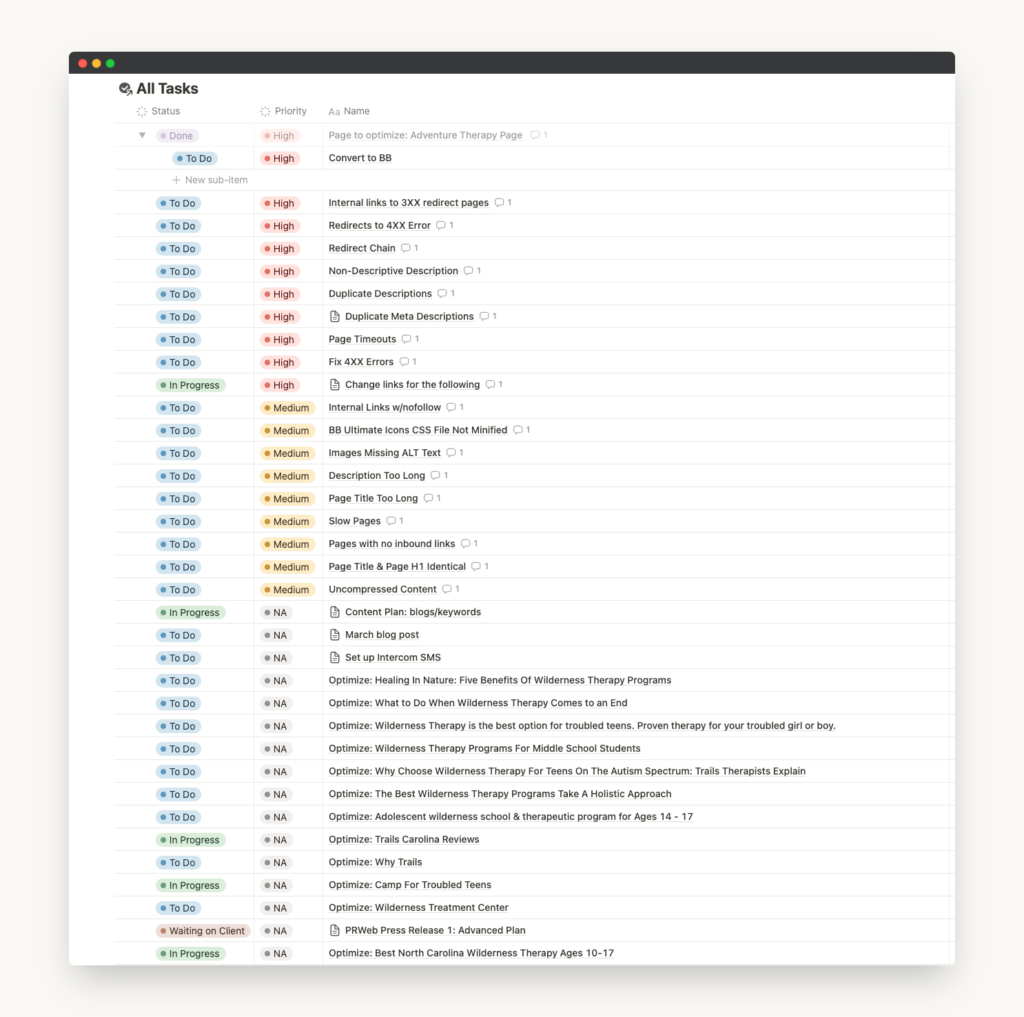
Technical SEO Implementation Plan
A solid technical SEO foundation ensures your website is easily crawlable, indexable, and accessible to both users and search engines.
Consider the following steps in your implementation plan:
- Analyze website architecture and structure: Review your site’s hierarchy and organization, making adjustments as needed to improve navigation and user experience.
- Review page speed and performance optimization opportunities: Utilize tools like Google PageSpeed Insights and GTmetrix to identify areas for improvement, such as image optimization, minifying code, and leveraging browser caching.
- Identify broken links, redirects, and other technical issues: Regularly audit your site for broken links, improper redirects, and crawl errors, addressing these issues promptly to maintain a healthy website.
Content Development Implementation Plan
High-quality, relevant content is vital for attracting and engaging your target audience.
To develop a robust content strategy, follow these steps:
- Create a content inventory of existing content: Catalog all content on your website, including articles, videos, images, and more, to assess its performance and identify areas for improvement.
- Identify topics to target with new content creation efforts: Analyze competitors’ websites, user intent research, and industry trends to discover gaps in your current content strategy and uncover new topics to target.
- Develop an editorial calendar for publishing new content regularly: Plan and schedule content production to ensure a consistent publishing cadence, which can help maintain and grow your organic search presence over time.
Linking Implementation Plan
A strong backlink profile is crucial for improving search engine rankings and driving referral traffic to your site.
To build and maintain a high-quality backlink profile, consider the following tactics:
- Assess the quality of backlinks pointing to your website: Regularly review your backlink profile to identify low-quality or spammy links, disavowing these harmful links to protect your site’s authority and reputation.
- Monitor link building activities to ensure they are in line with Google’s guidelines: Stay up-to-date with the latest best practices and avoid manipulative or black-hat tactics that could result in penalties or harm your rankings.
- Focus on acquiring high-quality, relevant backlinks from authoritative sources: Develop relationships with industry influencers, bloggers, and journalists, and create valuable, shareable content that naturally attracts backlinks. Consider guest posting, digital PR, and content syndication as additional strategies to earn high-quality backlinks.
By developing and executing a comprehensive enterprise SEO implementation plan that focuses on technical SEO, content development, and linking, your organization can maximize its online presence, attract more organic traffic, and outperform competitors in search engine rankings.
Effective Measurement of Enterprise SEO Success
Measuring the success of your enterprise SEO strategies’ success is essential for understanding the impact and making data-driven decisions to optimize your online presence.
In this section, we’ll explore the key components for measuring enterprise SEO success.
Establishing KPIs for Measuring Results
Key Performance Indicators (KPIs) are quantifiable metrics that help you evaluate the effectiveness of your SEO strategies.
Establishing KPIs allows you to focus on the most important aspects of your SEO efforts and track progress over time.
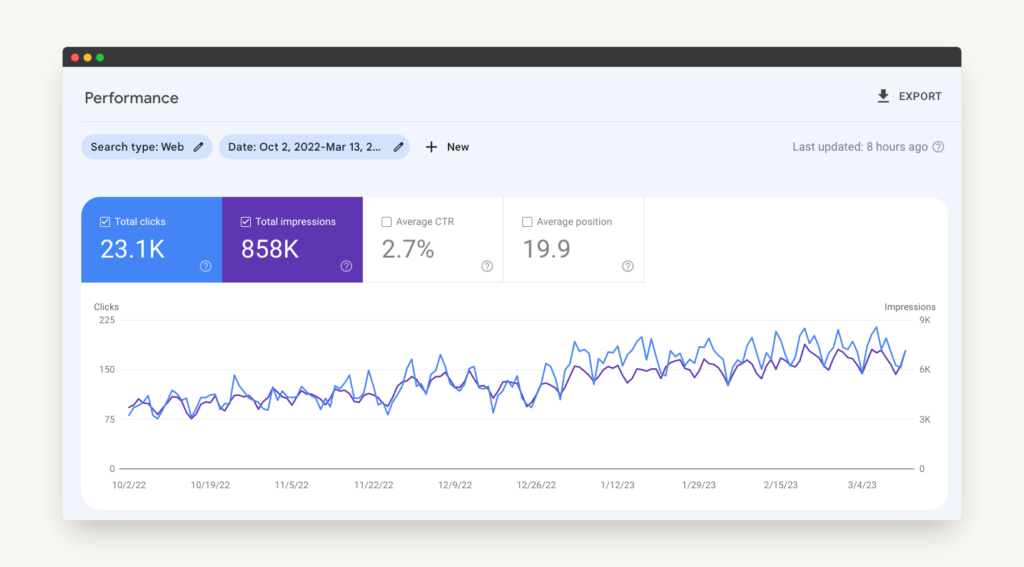
Some essential KPIs for enterprise SEO include:
- Organic search traffic: The volume of visitors arriving at your website through organic search results.
- Keyword rankings: The positions your website occupies for targeted keywords in search engine results pages (SERPs).
- Click-through rate (CTR): The percentage of users who click on your website’s listing in the SERPs.
- Bounce rate: The percentage of visitors who leave your website after viewing only one page.
- Conversion rate: The percentage of website visitors who complete a desired action, such as making a purchase, filling out a contact form, or subscribing to a newsletter.
Tracking Search Engine Rankings
Monitoring your site rank for targeted keywords is crucial for evaluating the success of your SEO efforts.
To track the keywords your site ranks for, consider the following tips:
- Utilize SEO tools: Leverage tools like SEMrush, Ahrefs, or Moz to track keyword rankings and monitor changes over time.
- Monitor competitor rankings: Keep an eye on the rankings of your top competitors to identify new opportunities and threats.
- Group short-tail keywords and long-tail keywords into topic cluster groups.
- Track rankings across devices and locations: Search results can vary depending on the device and location of the user, so monitor your rankings across various devices and geographic regions to gain a comprehensive understanding of your SEO performance.
Monitoring Traffic Patterns, Conversions, & User Behavior
To better understand your enterprise SEO success, you need to analyze traffic patterns, conversions, and user behavior on your enterprise-level website.
Consider the following:
- Use web analytics tools: Employ tools like Google Search Console, Google Analytics, and AHREFs to gain insights into visitor demographics, traffic sources, and user behavior on enterprise websites.
- Analyze conversion paths: Study the user journey from the initial entry point to the final conversion to identify areas of friction and opportunities for improvement.
- Monitor user engagement metrics: Keep track of metrics like average session duration, pages per session, and scroll depth to understand how users are interacting with your content.
- Conduct A/B testing: Regularly test different elements of your website, such as headlines, CTAs, and images, to optimize user experience and maximize conversions.
By establishing KPIs, tracking search engine rankings, and monitoring traffic patterns, conversions, and user behavior, you can effectively measure the success of your enterprise SEO efforts and make informed decisions to continually improve your online presence.
Summary of Key Points
In summary, maximizing your online presence with enterprise SEO tactics involves several key components:
- Conducting a comprehensive SEO audit to assess your current optimization level and identify improvement areas.
- Developing and implementing an enterprise SEO strategy that addresses technical SEO, content development, and linking.
- Measuring the success of your SEO efforts by establishing KPIs, tracking search engine rankings, and monitoring traffic patterns, conversions, and user behavior.
Importance of Consistency and Adaptability
To achieve long-term success in enterprise SEO, it’s crucial to maintain consistency in your efforts and remain adaptable in the ever-changing digital landscape.
Consistency in content creation, link building, and technical optimizations ensures continuous growth in organic traffic and improved search engine rankings.
Adaptability is equally important, as search engine algorithms and user behavior constantly evolve. Staying up-to-date with industry trends and best practices allows you to adjust your SEO strategies, ensuring sustained success.
Maximizing your online presence with enterprise SEO tactics is an ongoing process that requires commitment, consistency, and adaptability.
By conducting a thorough SEO audit, developing a robust implementation plan, and consistently measuring your success, your organization can achieve improved search engine rankings, increased organic traffic, and a stronger online presence.
Stay agile and responsive to the ever-changing digital landscape, and you’ll be well-equipped to overcome challenges and seize new opportunities for growth.
About the author
Mike McKearin is the CEO at WE•DO | SEO Expert | Adventurer | Optimist
Mike has a long history in the world of SEO, studying it and testing various methods for over two decades now. When he's not working on his business or being a dad, Mike loves to go on adventures with his family - they live in the beautiful state of North Carolina and love exploring all that it has to offer. He's an optimist who believes that anything is possible if you set your mind to it, and he wants to help others achieve their dreams through WE•DO
Free WordPress SEO Analysis
Want more traffic to your WordPress website? Get a free WordPress SEO Analysis and see how you can improve your traffic to get more sales online.
*This is a human SEO audit. Once we review your site we will reach out to schedule a time to review with you.